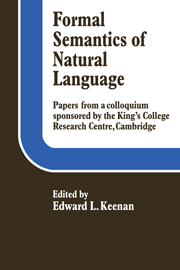Book contents
- Frontmatter
- Contents
- Notes on the contributors
- Acknowledgements
- Introduction
- I QUANTIFICATION IN NATURAL LANGUAGE
- II REFERENCE AND CROSS REFERENCE
- III INTENSIONAL LOGIC AND SYNTACTIC THEORY
- Two theories about adjectives
- Partial interpretations
- Subcategorization of adnominal and adverbial modifiers
- Should generative semantics be related to intensional logic?
- Transformational semantics
- IV QUESTIONING MODEL THEORETIC SEMANTICS
- V PRAGMATICS AND SENTENCES IN CONTEXT
- VI SEMANTICS AND SURFACE SYNTAX
Two theories about adjectives
Published online by Cambridge University Press: 05 November 2011
- Frontmatter
- Contents
- Notes on the contributors
- Acknowledgements
- Introduction
- I QUANTIFICATION IN NATURAL LANGUAGE
- II REFERENCE AND CROSS REFERENCE
- III INTENSIONAL LOGIC AND SYNTACTIC THEORY
- Two theories about adjectives
- Partial interpretations
- Subcategorization of adnominal and adverbial modifiers
- Should generative semantics be related to intensional logic?
- Transformational semantics
- IV QUESTIONING MODEL THEORETIC SEMANTICS
- V PRAGMATICS AND SENTENCES IN CONTEXT
- VI SEMANTICS AND SURFACE SYNTAX
Summary
I will discuss two theories about adjectives. The first theory dates from the late 1960s. It is stated in Montague (1970) and Parsons (1968). According to this theory the meaning of an adjective is a function which maps the meanings of noun phrases onto other such meanings; e.g. the meaning of clever is a function which maps the meaning of man into that of clever man, that of poodle onto that of clever poodle, etc. Predicative uses of adjectives are explained as elliptic attributive uses. Thus This dog is clever is analysed as This dog is a clever dog – or as This dog is a clever animal, or perhaps as This dog is a clever being. Which noun phrase ought to be supplied in this reduction of predicative to attributive use is in general not completely determined by the sentence itself, and to the extent that it is not, the sentence must be regarded as ambiguous.
The main virtue of this doctrine is that it enables us to treat, within a precise semantical theory for a natural language – as e.g. that of Montague – adjectives in such a way that certain sentences which are, or might well be, false are not branded by the semantics as logically true. Examples of such sentences are:
Every alleged thief is a thief
Every small elephant is small
If every flea is an animal, then every big flea is a big animal
- Type
- Chapter
- Information
- Formal Semantics of Natural Language , pp. 123 - 155Publisher: Cambridge University PressPrint publication year: 1975
- 240
- Cited by

